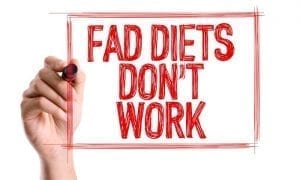Tis the season for weight loss resolutions. And with that comes the slew of diet infomercials, advertisements, and articles on Facebook. Lose weight quickly! Without exercise. No gimmicks – just follow these ten steps, eat only these certain foods but never touch these other foods, don’t eat this food with that food or eat before noon… Fad diets are just too much!!
What exactly is a fad diet? According to the University of Pittsburg Medical Center, a fad diet promises quick weight loss utilizing an unbalanced and unhealthy nutrition plan. You’ve heard of them – super high protein or high fat diets, juice/broth cleanses, food-combining diets, blood type diets, and many more. They lack sound scientific research and generally quote anecdotal “facts” as basis for their success.
While it can be exciting to start a new nutrition plan – fad diets can be harmful to your health and can even set you back in your weight management goals. You should avoid them at all costs, especially if you have a complicated relationship with food. Though that sounds silly, some people have been “dieting” as long as they can remember. They’ve tried all the fad diets – looking for the one that actually comes through on its promises.
 The reality is that fad diets do not produce lasting results. As a DIETitian, I do believe that some diets are necessary. These diets are considered medical nutrition therapy and they are used to treat or support some sort of disease process in the body. Specific diets are prescribed for kidney issues, brittle diabetes, wound healing and many more. Beyond that, subscribing to a particular diet can be counter-productive, possibly even harmful. Fad diets are problematic for many reasons. I’d like to focus on two.
The reality is that fad diets do not produce lasting results. As a DIETitian, I do believe that some diets are necessary. These diets are considered medical nutrition therapy and they are used to treat or support some sort of disease process in the body. Specific diets are prescribed for kidney issues, brittle diabetes, wound healing and many more. Beyond that, subscribing to a particular diet can be counter-productive, possibly even harmful. Fad diets are problematic for many reasons. I’d like to focus on two.
Fad diets do not promote long-term weight control. Many fad diets produce short-term water weight loss. Cutting carbohydrates or severely restricting calories causes the body to shed water. We lose “weight” when we shed water, but the minute you call it quits with the restrictive diet, the water weight comes back. Your body is happy it’s not starving anymore or jonesing for carbs – but the dieter is miffed because they have “failed” at their weight loss attempt.
Fad diets also leave out exercise, a crucial component to not only a healthy lifestyle, but also weight loss and weight management. Without an exercise habit, it’s difficult for almost anyone to lose weight and then maintain what they’ve lost!
The instant gratification of quick weight loss with restrictive and unbalanced nutrition plans does not pave the way for long-term weight management success. There is no focus on lifestyle change or healthy habit development necessary to maintain the weight lost on a fad diet. Without a change in habits, weight loss doesn’t stick because old eating patterns and poor food choices resume once the fad diet is done. It’s a change in one’s health behavior and food choices that leads to long-term success with weight loss.
Fad diets promote an “all or nothing” mentality among dieters with limited focus on moderation and balance. You’re either on or off your diet, eating good or bad food, succeeding or failing. These are not associations we should make with food and nourishing our bodies. Rather, we should see food as nutritious or not, a treat or a staple.
It’s too much pressure to perfect with every food choice. We don’t put that expectation on other areas of life, so why with food? What if you threw your hands up in the air and swore off all relationships because you had an awkward moment with a friend or didn’t respond as lovingly as you had hoped with your exhausted toddler? That would be crazy! Yet, it’s that kind of crazy reaction that happens with fad diets. You’re not allowed to have carbs but you were stuck at the doctor’s office for hours and ate some of the goldfish you packed for your kiddo to prevent hanger. Now you’re a failure? That’s doesn’t make sense.
Lasting weight loss and weight management come from improving lifestyle habits (such as regular exercise and adequate sleep) along with food choices and eating habits.  Adding more veggies to meals, decreasing fried food consumption, ditching sugary drinks and coffees, and enjoying treats occasionally are small changes that can lead to weight loss over time. Because fad diets promise quick weight loss, drastic changes in eating habits are implemented that will not endure life. How does a fad dieter handle holiday parties when they’ve cut out carbs? What does a fad dieter eat at a family reunion buffet when they cannot eat carbs and fat in the same meal? Does a fad dieter turn down homemade cookies from her proud daughter because wheat is forbidden on her fad diet?
Adding more veggies to meals, decreasing fried food consumption, ditching sugary drinks and coffees, and enjoying treats occasionally are small changes that can lead to weight loss over time. Because fad diets promise quick weight loss, drastic changes in eating habits are implemented that will not endure life. How does a fad dieter handle holiday parties when they’ve cut out carbs? What does a fad dieter eat at a family reunion buffet when they cannot eat carbs and fat in the same meal? Does a fad dieter turn down homemade cookies from her proud daughter because wheat is forbidden on her fad diet?
Losing weight is possible while enjoying life when principles of moderation and balance are applied on a daily basis. I encourage you in this resolution season to embrace a healthier lifestyle without subscribing to any fad diet. You’ll be wiser for doing so and more satisfied with your nutrition life. Guaranteed. *wink*



Recent Comments